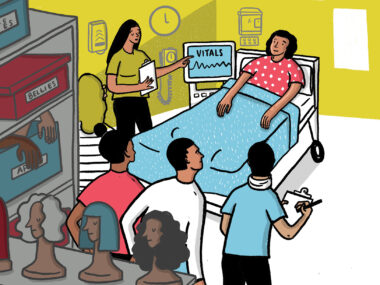Written by Kevin Brooker
It’s a sporting phenomenon we’ve never witnessed. Whereas TV commercials during NHL playoffs once focused on things like canola herbicides, this spring saw a disturbing new trend: back-to-back-to-back ads for online betting on the very games we were watching. It felt like we’d entered another world. There was the Great One himself, shilling hard for one brand of computerized bookie, while even Hockey Night In Canada’s Ron MacLean and the gang frequently veered off into discussing odds, seemingly validating gambling as Canada’s favourite pastime. If you once thought Canadians were plain, hard-working folks with an innocent love of hockey, forgive yourself if you now think we’re all turning into extras from the cast of Guys and Dolls.
As we plunge headlong into an unknown future following the federal government’s decision last year to change online betting regulations, one thing’s certain: at the University of Calgary, clinical psychologist Dr. David Hodgins, PhD, and his colleagues will be monitoring the emergent situation closely. In addition to his role as a professor specializing in addictions, Hodgins is a research co-ordinator for the Alberta Gambling Research Institute (AGRI), founded in 2000, a tri-partite consortium of academics that also includes the universities of Alberta and Lethbridge.
“The immediate impact will be the further normalization of gambling,” warns Hodgins, echoing worries being expressed on social media. “Decades ago gambling was thought of as immoral, something you kept secret, but it’s become part of everyday life—and now, sports. There’s an obvious concern that this advertising is introducing that culture to a new audience, particularly children.”

Photograph by Monique de St. Croix
AGRI, though funded by the Alberta government, maintains an arm’s-length relationship, meaning that it can study whatever it sees fit. Over the decades that has included multidisciplinary investigations as varied as neuroimaging gambling’s effects on the brain, examining impulsivity and other personality traits, as well as clinical studies of how problem gambling coexists with mental disorders and substance use.
While illicit sports betting has existed online for many years, and parlay betting (predicting multiple victors at once, as with the Western Canada Lottery Corporation’s long-running Sport Select game) has been legal in Alberta since 1985, Hodgins and his team are already considering avenues of research into this new platform for sports betting, which, while legal in Ontario, is not yet permitted in Alberta. Given the federal decision, future rule changes seem all but inevitable here and in other provinces.
“This was predicated by the federal government’s decision last August to allow single-game betting,” Hodgins says. “Ontario was the first to partner with online bookmakers, who are all jockeying for market share—hence the deluge of ads.” Meanwhile, this all leaves a vast regulatory grey area while other provinces make up their legislative minds.
Of prime concern is the amplified pace of play. “Research has consistently shown that instant-win types of betting, like VLTs, create the highest rates of problem gambling,” says Hodgins. Unlike parlays, where the bettor must wait for numerous games to play out, single-game outcomes happen much quicker. Then there’s the lightning-fast operation of in-game proposition bets, like “Which team will score first in the second half?” And all of it is baited by and accomplished on a smartphone, the addictiveness of which is by now well-documented.
Another component of risk will undoubtedly stem from the psychology of rabid sports fans, the ones who believe that, thanks to their encyclopedic study of the game, they know better than anyone who’s likely to win. At least to begin with they’ll be motivated to bet hard and bet often. Yet Hodgins says that the fabled professional sports bettor is largely just that, a fable. “Considering all forms of gambling, few people consistently make money, and mainly just poker players. Again, they are very, very few,” he says.
In straight betting the house always gets its money back over time. One more well-understood factor is that problem gamblers disproportionately remember the wins but forget the losses.
On top of that, Hodgins says, many display an unhealthy degree of magical thinking. “It’s been shown that if you give people a pair of dice and ask them to roll snake-eyes, they’ll toss them gently,” he says. “Ask for a pair of sixes and they’ll really fire them out there.”
Much of AGRI’s research involves devising and testing ways to minimize the harms of problem gambling. “Self-exclusion is one strategy that casinos have used for years,” says Hodgins, referring to the practice of voluntarily putting your name on a list that ensures you’re refused entry when your resolve slips. “We’re looking at ways to translate that to the online environment; one of the advantages of those platforms is that it’s easier to build in some safeguards, like setting personal ceilings of money and time spent. Those currently tend to be voluntary in many jurisdictions, which aren’t as effective as mandatory ones.”
Recently, Dr. Hodgins was part of a team that conducted a study in Norway, where all gambling requires registration, thus allowing every transaction to be tracked. “We selected the greatest spenders and then the gambling provider reached out with a notice providing information about their expenditures,” says Hodgins. “One cohort was contacted by mail, one by phone, and the control group was uncontacted. Whereas both groups of contactees were subsequently found to have moderated their play, the ones who were advised by telephone were shown to experience the greatest reduction in gambling outlay.”
Would Canadian regulators—not to mention the betting houses themselves—enable that sort of built-in data-monitoring? “The gambling industry is very resistant to the idea,” says Hodgins. “They say it’s unpleasant and intrusive. But our findings in Norway indicated that the customers actually appreciated being contacted.” Having a real human being display concern is clearly a motivating factor.
Ideally, of course, the best solution is not to get overinvolved in the first place. “We just completed a large international study establishing the best policies to include in public messaging about maintaining personal control,” says Hodgins. “That includes things like not gambling more than once a week, nor ever spending more than one per cent of family income.”
According to a 2018 AGRI study, 0.6 per cent of Canadian gamblers fall into the problem category, with 2.7 per cent considered “at-risk.” The good news is that those figures were lower than 2002 levels. However, with a huge new gambling temptation we should expect an equivalent rise in participation, which is exactly what happened in the U.S., where they are a couple years further down the sports-betting trail. Sure, things might go differently here. But what are the odds?




